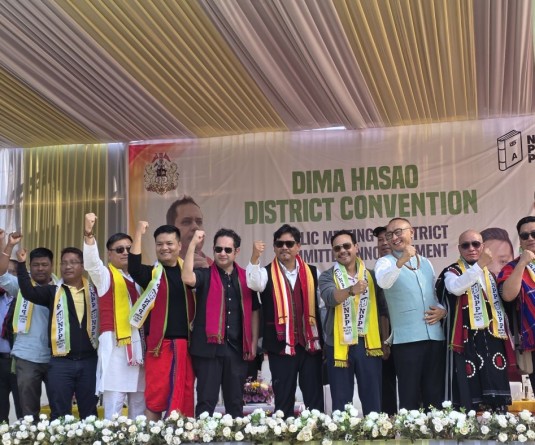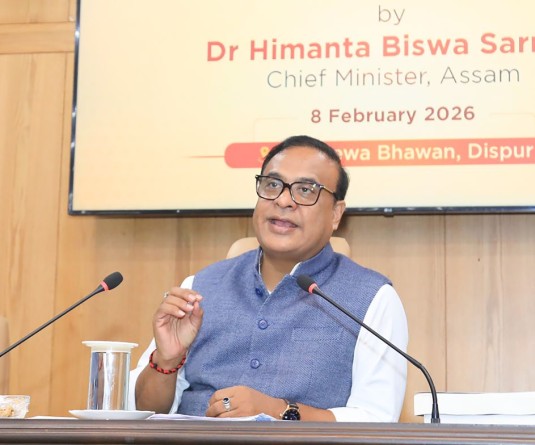
Dimapur, November 26 (MExN): The Third Northeast India Indigenous Women Peace Congrega-tion was held virtually on November 21 via Zoom, with indigenous women of Northeast India and the world gathering to share experiences, lessons and to adopt resolutions for their future.
Held under the theme, ‘Working towards Our Collective Peace, Justice and Our Rights,’ the peace congregation was organized by the Manipur Women Gun Survivors Network, Northeast India Women Initiative for Peace and The Global Alliance of Indigenous Peoples, Gender Justice & Peace, stated a press release received here on November 26.
The congregation saw the gathering of over 51 indigenous scholars, practitioners and women rights activists from eight states of Northeast India and also from around the world including indigenous women leaders from the Americas, Peru, Japan, Philippines and Bangladesh.
Binalakshmi Nepram, Founder of Manipur Women Gun Survivors Network and the convener of the peace congregation gave the opening remarks narrating the importance of how she and many others in Northeast India Women Initiative for Peace started the First Women Peace Congregation in March 2015 in Imphal, with the aim to ensure that women of Northeast India are made equal stake-holders in peace and conflict resolution processes to bring lasting peace in the region.
Stating that “Northeast India has been torn by seven decades of armed conflict where over 50,000 people have been killed,” Nepram reiterated that lasting peace can come only when women are made a part of the efforts.
The keynote speech was given by Professor Elsa Stamatopoulou, Columbia University, where she expounded on the roles that Indigenous women have taken up as mediators and peace builders, in order to address these issues at the local, national and international levels.
Professor Stamatopoulou further stated that the struggles of indigenous peoples are embraced by International Law and that the UN Declaration on the Rights of Indigenous Peoples (UNDRIP) is a major normative framework for preventing and solving conflicts.
She concluded her speech by stating that “Resistance, persistence, resilience, vision for life” are the four words that embrace indigenous women’s struggles for peace.
Several other speakers including Niketu Iralu, a prominent Naga intellectual from Nagaland, Jarjum Ete, former Chairperson of Arunachal Pradesh Women Commission, Roshmi Goswami, co-founder of North East Network, Elvera Sargent, a member of the Mohawk Nation in Akwasne belonging to the Haudenosaunee Confederacy, Tarcila Rivera Zea, an eminent Indigenous woman leader from Peru and founder of the organization Chirapaq, Ima Lourembam Nganbi, noted Meira Paibi Woman Leader from Manipur, Rose Mangshi Haokip, a distinguished Kuki woman leader from Kuki Wom-en’s Union, among others, highlighted on the various struggles of indigenous women and people in their regions.
Resolutions adopted
According to the release, the peace congregation adopted several resolutions such as setting up a Truth and Reconciliation Commission for Northeast India to investigation into all forms of death, disappearances and acts of genocide and ethnic cleansing of Indigenous People from Northeast In-dia since 1949 till date. This, it said, is important to acknowledge our past, to understand our present and take positive steps for future peace in region.
The need to recognize racial, gender and environmental violence, population engineering, distortion of histories, cultures, languages, rituals and indigenous ways of life and indigenous faith in the re-gion and find ways to protect them were also underscored in the resolution.
It also took cognizance of the rising violence against indigenous women and girls, arms and narco-trafficking in the region, while acknowledging its impact on the youth, security and democracy.
The congregation also resolved to discuss ways to bring peaceful resolution of political settlement to the conflicts in the region and ensure that women are included in all peace talks, negotiations and decision making.
According to the release, the peace congregation also resolved to call for the setting up of an anti-racial law to stop racial violence against indigenous peoples of Northeast India and call for repeal the Citizenship Amendment Act passed in Dec 2019, as this Act also impacts and discriminates In-digenous Peoples.
“The Women Congregation also recognizes that Armed Forces Special Powers Act has been conti-nuously imposed in the Northeast region since 1958 and that its removal will be the greatest confi-dence building measure that Government of India can do to the people of Northeast India. Sincere efforts must be made to de-militarize the region so peoples and children of Northeast India can grow up in peaceful, nurturing environment,” the release stated.
The Congregation is launching the ‘De-militarise Indigenous Territories Northeast India,’ ‘Lay Down Your Arms’ Campaign, it added.
Further, it underscored that resources spent in militarization, counter-insurgency operations in Northeast India should be rather invested in health, education, and fight environment degradation of the indigenous peoples of Northeast India. Extraction industries should not be allowed to destroy the forests and living habitats and biodiversity of indigenous peoples of Northeast Region, it asserted.
Among others, the congregation laid emphasis on the need to strengthen survivors’ assistance and ensure economic empowerment programs to help support women and children survivors of violence and all forms of violent conflict. It also resolved to ensure that all perpetrators of sexual violence committed by state and non-state, are punished and justice is delivered.
As per the release, the peace congregation resolved to stop the rising threats and attacks against In-digenous women and other human rights defenders, media, etc, in the region and protect freedom of expression which, it said, is a must for a robust democracy.
To increase women participation in decision making, it also set an aim to ensure 100 indigenous women in decision making positions, in social, economic, and political spheres. Gender budgeting with proper allocation of resources must be done at every state in Northeast India so that proper re-sources can be set aside, it stated, while emphasizing on forging alliances with other global indi-genous women leaders and communities to work towards ensuring rule of law and deepen democ-racy.
The congregation meanwhile expressed condolences to families who have lost loved ones to the COVID-19 pandemic and called upon all to work together to get through this crisis.






